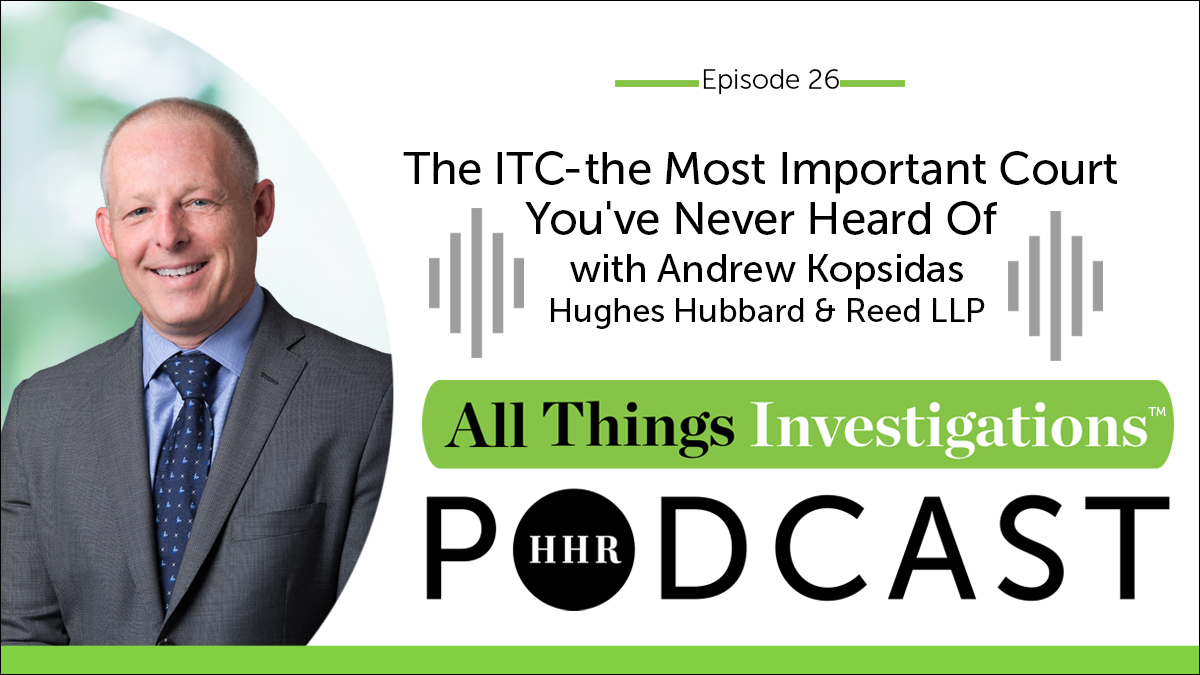
Did you know about a powerful court that handles investigations of products imported into the US? On this episode of All Things Investigations, host Tom Fox sits down with Andrew Kopsidas to discuss the International Trade Commission (ITC). Andrew walks Tom through the ins and outs of the ITC, including its broad definition of unfair trade practices, the plaintiff and defendant roles, and the power of the agency to bar products from entering the US. He also shares insights on the speed of ITC cases, the role of administrative law judges, and the importance of having good ITC counsel.
Andrew Kopsidas is a litigation and strategic consulting expert with over 20 years of experience in intellectual property (IP) matters. He graduated from George Washington University Law School in 1999, after earning a degree in aerospace engineering from the University of Maryland. Kopsidas is a partner at Hughes Hubbard & Reed, where he advises clients on litigation and strategic counseling matters related to IP.
You’ll hear Tom and Andrew discuss these ideas:
- The ITC is a federal agency that investigates unfair trade practices related to international trade, with the power to bar products from entering the US.
- Any company that has a domestic industry in the US and is facing imports of products made in a foreign country using unfair trade practices can file a complaint with the ITC.
- Unfair trade practices can include patent and trademark infringement, trade secret misappropriation, false advertising, and more.
- ITC cases move quickly, with only 30 days to prepare for discovery and respond to requests, making it crucial for in-house counsel to act fast and get management buy-in.
- Administrative law judges are the fact-finders in ITC cases, and their credibility determinations can be influenced by the reputation of the lawyers involved.
- ITC lawyers must have knowledge of the nuances of ITC practice and be able to work with the Office of Unfair Import Investigations and persuade them that their side of the case is right.
- Andrew emphasizes early assessment of cases. He recommends organizing a scrub session with the outside litigation team and employees to go through the merits of the case. He points out that it’s important to consider the client’s objectives to find the best solution for their business.
- The ITC litigation process is strictly one way, with no counterclaims, and the respondent is always on the receiving end.
- The government attorneys at the ITC are neutral and trained to represent the public interest. They participate in discovery and give their opinion right before the trial.
- Going on the offensive is an essential strategy for a defendant in an ITC case. For example, a defendant can file their ITC action as a counteraction, file district court actions, or refuse to stay the district court case.
- Trials in the ITC can be a lot like a district court, but without a jury. The rules of evidence are not as stringent as in district court.
- Companies should take ITC cases seriously and avoid hiring inexperienced counsel as there is a lot of nuance to ITC practice.
KEY QUOTES
“I’ve seen a lot of good lawyers stumble in the ITC because they just weren’t familiar with the nuance of practice.” – Andrew Kopsidas
“If a company isn’t taking things seriously, the case can be lost before it’s practically even begun.” – Andrew Kopsidas
“The first question I like to ask clients is, What’s your business objective here? We as litigators a lot of times want to think that what we do is the be all and end all. Really we’re just a tool for these companies that have broader business objectives and we need to keep that in perspective.” – Andrew Kopsidas
Resources:
Hughes Hubbard & Reed website
Andrew Kopsidas on LinkedIn


